by Ariane ~ February 19, 2018
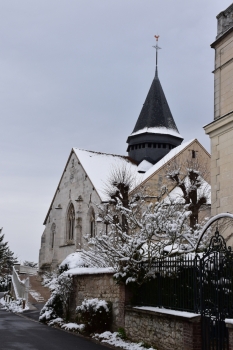
It was lovely last week to see the snow covered roof of Giverny’s church. It’s unusual here and never lasts long. This may be the reason why snow looks lovely for the inhabitants of Monet’s village, because on the other hand it makes life more complicated. As snow is rare, nothing is organized for it, especially transportation. Kids don’t go to school anymore, trucks are not allowed to drive and shops don’t get fresh goods. Fortunately after a couple of days snow vanishes and life is normal again.
by Ariane ~ February 7, 2018
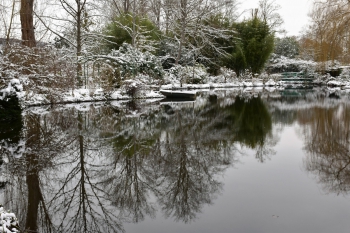
Some snow has fallen on Giverny! Claude Monet’s pond that will be graced with water lilies in summer is not frozen. It reflects the evergreen bamboos and the snow covered shrubs and trees around. The roots of the water lilies are dormant under the surface, waiting for warmer times to come. In the distance you can see the Japanese footbridge and its canopy of wisteria, all white for the moment. (Click for larger picture)
by Ariane ~ January 31, 2018
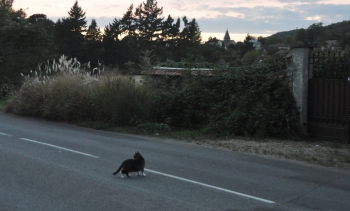
The little triangular roof you can spot in the distance is the bell tower of Giverny’s church. This cat is crossing the main road, chemin du Roy, without any fear from cars and buses. Sunset is a peaceful time in Claude Monet’s village, just like winter.
In French the expression for ‘there isn’t a soul’ is ‘il n’y a pas un chat’, there isn’t a single cat. You could say ‘il n’y a pas âme qui vive’, not a living soul, but it is elevated language.
Actually sunset and winter are the best time for cats to live their own life at Giverny, when the streets are theirs again. They all belong to somebody – no wild turned cats here, as it may be the case in cities, but cats roaming and exploring their territories.

They are wonderful to look at. They are fabulously supple, bouncy, capturing with their eyes, nostrils and whiskers details we have no idea about. They stop unexpectedly in their walk, watching. They jump to the top of the wall, they walk along like a funambulist. They feel at home everywhere, including in Monet’s gardens.
by Ariane ~ January 1, 2018
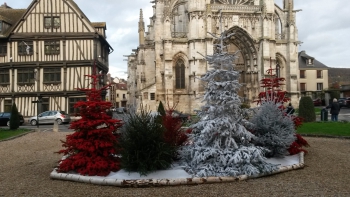
Vernon’s motto is Vernon semper viret, Vernon ever green, and it is true that it rarely snows in the valley of the Seine. The last year a foot of snow fell on Giverny was in 2012…
This is why it is inspiring to see these snow-covered fir trees in front of the Eglise Notre-Dame and the tourist information office. Do you like the red ones too?
Whether it is mild, warm or ice-cold where you live, I wish you a happy New Year and all the best for you and your loved ones in 2018.
by Ariane ~ December 11, 2017
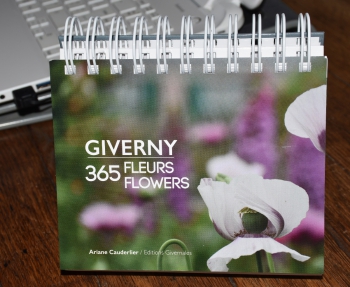
Are you curious about flower names? Would you enjoy a picture a day of Giverny’s flowers? This new perpetual calendar is great to get familiar with the flowers that grow in Claude Monet’s gardens. I’ve sorted out my best pictures and identified the flowers with the help of the Giverny gardeners. Botanical name, common name, even French name and photo date are specified for each flower.
On some pictures you will recognize the place in the background, just like the poppy picture on the cover. This perpetual calendar is for Giverny lovers and flower lovers alike.
The cost is 19 euros + shipment. If you can wait for 2 weeks, the shipment is 4 euros only. Just drop me a comment and I will be back in touch with the details.
Enjoy December!
by Ariane ~ November 6, 2017
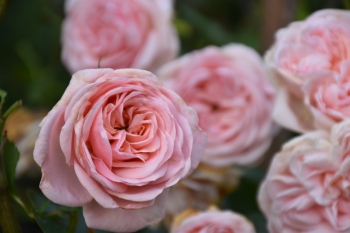
Giverny has been closed since the 1st of November 2017. Claude Monet’s house and gardens will reopen on the 23rd of March 2018.
The last day, I went photo hunting for the last flowers. That’s a special kind of safari, totally harmless but I found it exciting. These roses are my best prey. Yes, there are still a few roses in Fall at Giverny, as long as it doesn’t freeze. Sometimes they last up to Christmas.
by Ariane ~ October 6, 2017
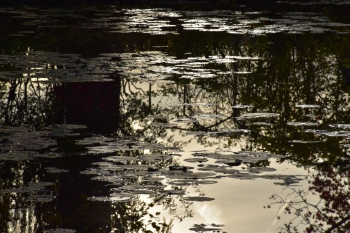
This is not black and white, it’s a color pic of Giverny.
In back light the colors disappear on Monet’s pond.
They are turned into shades of grey or sepia.
The picture resembles a vintage photo.
Reducing the colors makes the light look more vibrant.
by Ariane ~ September 23, 2017
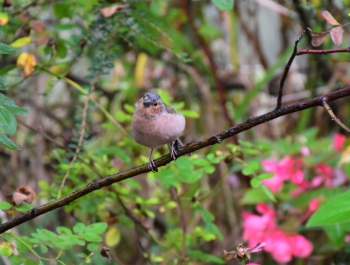
This fat boy is a finch. Finches are the most common birds at Giverny. They are easy to recognize with their pink belly and their grey hood. They sing, they hop around, they don’t seem to care about visitors. They live their own lives.
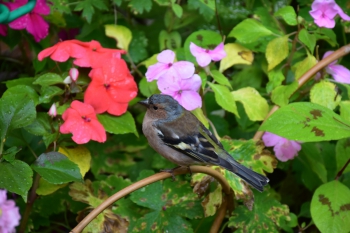
Like butterflies, birds bring their own magic into the garden of Monet.
Robins are also common and cute with their scarlet belly. When gardeners work, the robin that ‘owns’ the place is never very far away. And gardeners work at Giverny on a daily basis…
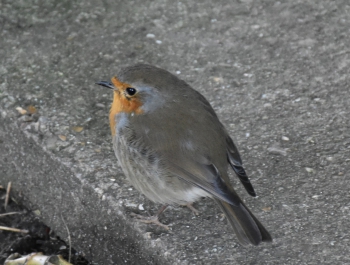
by Ariane ~ September 2, 2017
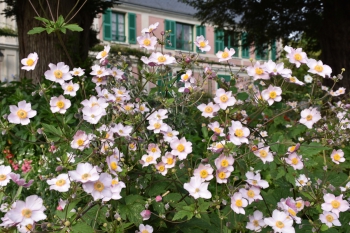
Late summer is a feast for the eyes in Monet’s gardens at Giverny.
Japanese anemones, among many other flowers, are at their best.
Claude Monet grew them along the main alley.
He loved their elegant white flowers popping out against a beautiful green foliage.
On the photos taken in his times, simple white Japanese anemones can be seen.
Nowadays they also exist in pink and can be double or even fluffy.
All of them are lovely perennials that last for decades.
by Ariane ~ August 18, 2017
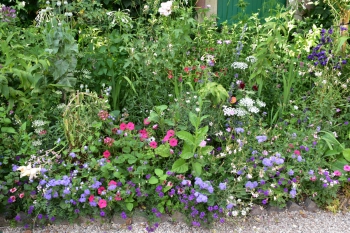
Many visitors of Giverny feel inspired by Monet’s flower garden. Here is how to capture its spirit:
- choose a main color to create an almost monochromatic flower bed
- combine as many different flowers in this range of color as possible
- mix up flower sizes and shapes, trying not to have two same flowers side by side
- look for petals having different textures, from velvet to feather
- blur the lines of the borders
Your border should resemble a living impressionist painting, where petals are used like brushstrokes. Happy gardening!
Flowers used in the bed on the picture: ageratum, petunia, browallia, carnation, verbena, gaura, salvia, nicotiana, agrostemma, cleome, anthemis, canterbury bell, malva, papaver somniferum, ammi visnaga, iris, gladiola…
by Ariane ~ July 24, 2017
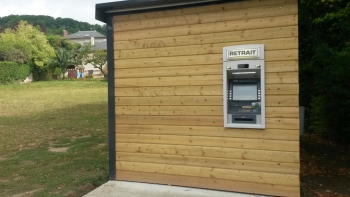
A cash dispenser has been recently installed at Giverny. It is located just after the museum of impressionisms in the direction to the church. On the left side of the picture you can see the school of Giverny in the background.
The banking machine is user friendly. The instructions are available in many different languages. I tested it, it works!
The cashpoint replaces a phone box that is of no use anymore since everybody has a mobile phone.
Edit 2022: the ATM is now at the bakery, farther away in the direction to the church.
by Ariane ~ June 23, 2017
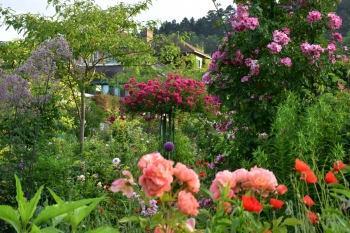
Monet’s garden at Giverny mid-June. Click to enlarge.
In June, roses blossom in every gardens, and especially in Monet’s flower garden at Giverny. The painter loved to trim them along trellises of all kinds, tripods, arches, or these big mushrooms that are so iconic for Giverny.
June is also the time for poppies and alliums, the big round shaped garlic flowers. Not to mention the huge pigamon, aka thalictrum aquilegifolia, that looks like mauve powder. The garden is full of pinks, reds and purples.
Summer will turn it yellow. Can you see the big leaves in the foreground of the pic? Sunflowers are growing now, to surprise visitors with their dinner plate golden flowers in a month.
by Ariane ~ June 7, 2017
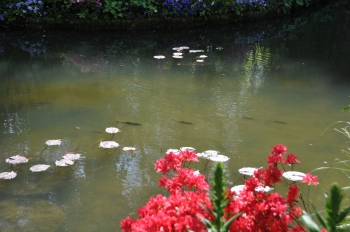
Is there fish in Monet’s pond at Giverny? This is a question visitors ask frequently.
The water lily pond houses a few big carps, maybe eight according to the gardeners.
There are also smaller fish like ruds, that have orange fins, and at least a perch and a pike.
All of them are wild fish that can be found in streams nearby.
They contribute to the ecosystem of the pond and are invaluable to keep this little microcosm balanced.
The Giverny fish are greyish, silvery, but not colorful. No koi carps here, although they would add to the oriental look of the garden.
As mute as they may be, they are visible enough for the heron that visits the pond at dawn. The water is too deep for him to stand in it, but he stays on the side and keeps a close eye on the fish, hoping one will come near enough to be turned into his breakfast.
by Ariane ~ May 14, 2017
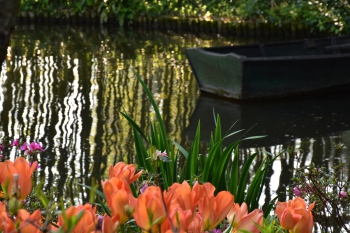
The bamboos reflection on Claude Monet’s water lily pond at Giverny adds a lot of interest to the scene, thanks to their moving lines. Their slow motion is quite hypnotic for the viewer, and their geometric aspect contrasts with the other plants all around.
by Ariane ~ April 28, 2017
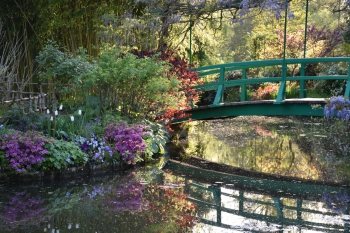
Spring makes us all want to walk in beautiful gardens. At Giverny, azaleas and tulips gradually give way to irises, peonies and wisterias. The first water lilies should open within two weeks, recreating once more Monet’s beautiful setting and endless source of inspiration. 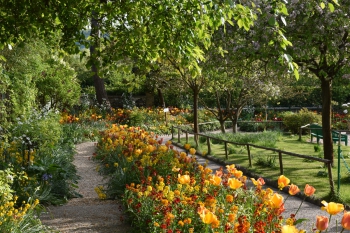
In the flower garden, visitors meander inside of a living painting where flowers recreate the illusion of brushstrokes. Monet had good reasons to claim that his garden was his most beautiful masterpiece.
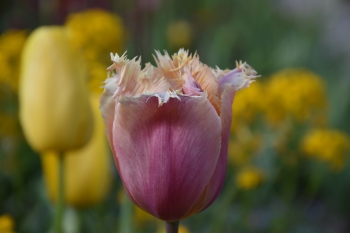
Just like you can see the brushwork when you tour an exhibition and have a close look at paintings, at Giverny each single flower is a little universe in itself, offering its beauties to our admiration.
















